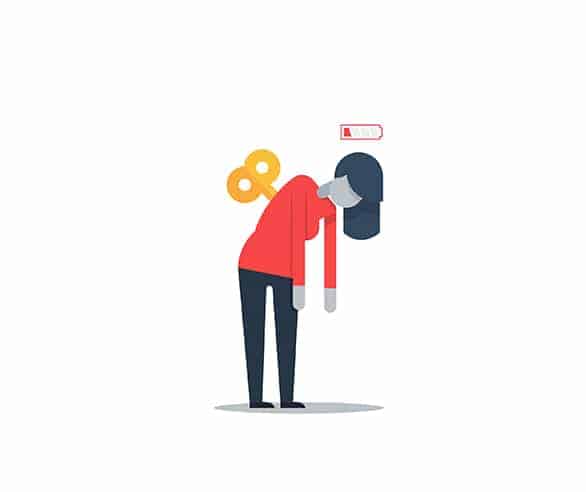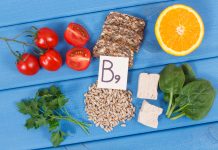
BY CAYLA RAMEY
peer reviewed by marita schauch, bsc, nd
Adrenal fatigue became a prominent disorder in the late 1990s, with millions of people affected in the present day. The condition stems from overworked adrenal glands failing to produce enough hormones. Adrenal conditions include adrenal tumors, Addison’s disease, Cushing’s disease, and hypoaldosteronism. Many alternative practitioners will treat adrenal fatigue with supplements and the recommendation of healthy eating and exercise. However, conventional medicine has not recognized adrenal fatigue as a medical condition, so there are no medications dedicated to it. Cushing’s disease is sometimes treated with medications that control the excessive production of cortisol, such as ketoconazole and mitotane. Hypoaldosternoism would be treated for cortisol deficiency with a glucocorticoid.
There are many natural options and supplements that can be taken to help support the adrenal system, such as holy basil (ocimum tenuiflorum) and vitamin C (ascorbic acid). Below is a summary of the current evidence for these options.
VITAMIN C – 100MG DAILY
Vitamin C maintains healthy levels of cortisol and DHEA, which are both needed for proper adrenal function (Patak, 2004). DHEA levels decline as we age (Zaluska, 2009) and the unabated action of cortisol with declining DHEA levels contributes to stress-related conditions. The adrenal gland is among those organs with the highest concentration of vitamin C (Patak, 2004). Ascorbic acid is required for protein metabolism, certain neurotransmitters, L-carnitine, and the biosynthesis of collagen. Moderate doses of 100mg per day have a higher absorption rate at 70-90 per cent. Studies have been considering the relationship between adrenal function and ascorbic acid for many years.
EVIDENCE FOR VITAMIN C
Research has shown that adrenal glands require ascorbic acid to maintain proper and healthy function. One study found that having an ascorbic deficiency can have profound effects on adrenal function (Brody, 2002). Vitamin C has multiple benefits, acting as an anti-inflammatory and aiding in soft tissue repair (Evans, 2008). Another study documents how vitamin C increases the body’s ability to circulate cortisol after an ultramarathon (Peters, 2001). Stress, whether on the mind or the body, will trigger cortisol production, and constant overproduction can cause damage to the adrenal glands as they try to keep up with the hormone production. Within this same study, the effects of vitamin C supplementation on the alterations in circulating concentrations of cortisol were measured using immuno-chemiluminescence, radioimmunoassay and ELISA procedures (Peters, 2001). The participants were split into three equal groups: one received 500 mg a day Vit C (VC-500), one 1500 mg a day Vit C (VC-1500) and the last received a placebo for seven days before the day, the day of, and for two days afterwards. They found a 30 per cent reduction in post-race serum cortisol levels with the VC-1500 group. Though these measures were for athletes, stress can trigger symptoms similar to those seen post-workout, including the overproduction of cortisol levels, which the adrenal glands cannot properly regulate. Based on these studies, ascorbic is beneficial in the treatment of low adrenal function, as it can help regulate healthy hormone production.
HOLY BASIL – 1000MG DAILY
Healthy adrenal hormones are required to control blood sugar levels (Jyoti, 2007). Many herbs that are recommended for their anti-stress properties often stimulate an increase in energy or libido. Ocimum sanctum is an adaptogen herb, meaning that it helps the body function at optimal levels without effecting mood during periods of stress. Though fatigue is often a side effect of low adrenal function, in the long term, a stimulate will not help your adrenal glands rest—which is part of the reason why there may be a problem now. Holy basil has been proven to lower blood sugar levels (Jyoti, 2007) and also aids in reducing cortisol levels (Sembulingam, 1997). The recommended amount is 500mg of the leaf extract taken twice daily.
EVIDENCE
Ocimum sanctum has been in the spotlight for a number of years, with researchers studying its relationship with stress for over four decades. One study found that within stressed-out rats, Ocimum sanctum prevented changes in the plasma level of corticosterone (Sembulingam, 1997). While this study was conducted on animals and is also older, the findings are still relevant in controlling cortisol levels. Another study involving rabbits showed a significant decrease in blood sugar levels after 30 days of dietary supplementation of Ocimum sanctum leaves (Jyoti, 2007). The same study suggests that the potential anti-stressor properties of holy basil are in part attributed to its antioxidant properties. According to a more recent study, adaptogen herbs promote adaptation to environmental stress by modulating stress responses, enhancing energy production and sleep quality and improving the immune system (Stansbury, 2012). The researchers found that holy basil is beneficial for the treatment of elevated cortisol levels, adrenal deficiency, low DHEAS and alterations in DHEAS and cortisol ratios. They also noted that it is safe to take with other medications. VM











